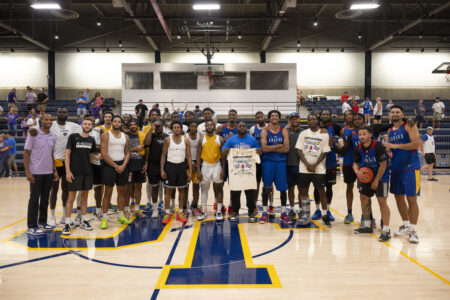Report: N.C. congressman to file bill allowing student-athletes to earn compensation off likeness
A congressman from North Carolina is expected to file federal legislation that would pave the way for college athletes to earn money off endorsements, according to a Raleigh News & Observer report.
Rep. Mark Walker, who is a member of the U.S. House Republican leadership, plans to file a bill next week titled the “Student-Athlete Equity Act.” The bill aims to remove a U.S. tax code restriction on amateur sports organizations that bars student-athletes from earning compensation for their name, image and likeness, according to the report.
The bill could drastically change the landscape of college athletics, particularly the scandal-plagued world of college basketball. The topic of paying athletes has come up frequently in recent months because of an October trial that found a former Adidas executive and others guilty of defrauding universities by paying the families of highly-touted recruits to play for certain college basketball programs, including the University of Kansas.
Walker, who previously called for the NCAA to allow the players to earn money through endorsements, said the bill would not force the NCAA or its institutions to pay student-athletes, but would open the door for student-athletes to make money off the court, according to the report.
“Here’s the thing: We’re not asking the university, we’re not asking the NCAA to pay a single dollar into this,” Walker said. “You’ve done your part offering a full scholarship. Just don’t restrict the rest of it.”
Current NCAA rules do not allow for student-athletes to receive any compensation other than scholarships and related amenities provided by universities.
Players who have accepted compensation are often ruled ineligible to participate in NCAA-sanctioned sporting events, and universities that the NCAA finds are aware or should have been aware of such compensation often receive additional NCAA sanctions.
The NCAA recently ruled KU basketball player Silvio De Sousa ineligible from participating in games until the 2020-2021 season because the October federal trial on college basketball corruption revealed that his guardian Fenny Falmagne accepted $2,500 from an Adidas consultant to steer De Sousa to KU.
The trial also revealed the mother of former KU player Billy Preston received $90,000. Preston never played in an official game for KU.
On Oct. 24, at the conclusion of the trial, a jury found former Adidas executive James Gatto, business manager Christian Dawkins and amateur league director Merl Code guilty of fraud. On Tuesday, Judge Lewis A. Kaplan of the Southern District of New York sentenced Gatto to nine months in prison and Code and Dawkins to six months in prison.
Whether the NCAA will impose sanctions on KU is not yet known.
Contact Dylan Lysen
Have a story idea, news or information to share? Contact University of Kansas, higher education, state government reporter Dylan Lysen:
- • dlysen@ljworld.com
- • 785-832-6353
- • Twitter: @DylanLysen
- • Read other stories by Dylan







